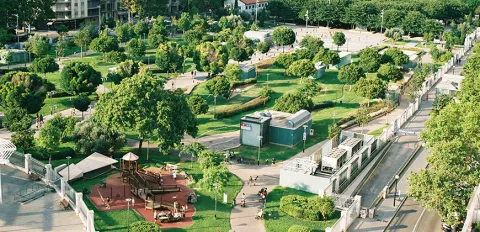Urban Systems Guest Speaker: Charles Montgomery, Well-being in Cities

- Master of Engineering Leadership
On June 18, MEL students in Urban Systems attended a guest-speaker presentation on the topic of Well-being in Cities, hosted by Charles Montgomery. Charles is an award-winning author, urbanist and leader of transformative experiments, research and interventions for well-being in cities. His acclaimed book, Happy City: Transforming Our Lives Through Urban Design, examines the intersection between urban design and the emerging science of happiness. After delivering his presentation, students engaged in an informative Question & Answer session.
During the Q&A period, MEL students had the opportunity to ask Charles live questions regarding his experience in urban development, his opinions on the future of cities, and how to design happier cities. Students explored how radical change takes place in cities through the advocacy of politicians and grassroots campaigns, how increasing population density and climate change issues may negatively impact happiness, and what factors should be taken into consideration when designing a happy city.
As demonstrated in Happy City, science shows that happiness is connected to social trust and connection, as well as to social equity and trust in government.
Charles shared how he and his colleagues had created a Happy City Index that looks at three key factors that indicate whether a city’s residents are happy.
The factors are:
- Happiness (subjective well-being)
- Challenged-Thriving (using all talents energetically while succeeding)
- Healthy Life Years
Another great measure of well-being that Charles noted is social trust; neighbourhoods where people can trust their neighbours always report high level of happiness.
In response to challenges of urban density, Charles noted that while smaller cities tend to be happier because they have higher levels of trust, in reality, megacities are necessary and unavoidable.
To ensure that megacities are happy, Charles emphasized how urban planners should treat edge zones like future community hearts, and reserves spaces for parks, plazas, and mobility networks long before informal development comes. He emphasized how walking itself is medicine; the more natural spaces the city can provide for pedestrians, the healthier our populations will be.
In relation to urban density and the COVID-19 pandemic, Charles shared how people are becoming fearful of urban density and see it as the root of many problems. While young people have been tending to prefer working and living in walkable places in comparison to the suburbs, the pandemic is creating new fears of city-living. However, Charles highlighted that many of these fears are unfounded by research. He stated that there is no correlation between density and spread of the virus. A stronger correlation exists within autodependent-dispersed neighbourhoods. The reason may be that dispersed people travel to large stores which then become centres of high contamination.
Charles shared how progress in cities is linked to both high-level activism by organizations and politicians, as well as grassroots campaigns. When seeking change in a city, even radical change, he advised students to consider the power of a multifaceted approach that involves both high-level and grassroots activism.
He also emphasized that when seeking the input of residents, cities should shift their perspective and frame their questions on challenging issues as conversations on what residents’ goals and values are for health and resilience. Emphasizing hope and collaboration is important when unifying a city towards a goal or facing troubling challenges, such as climate change.
Speaking to future leaders in Urban Systems, Charles reminded the MEL students that their work is incredibly influential on the health and happiness of citizens because they mediate the ability for people to connect with one another. He noted how highways will push people apart, while transit-oriented developments create conditions for people to live closer and connect. This impacts city systems, which impacts behaviour, which then impact people’s lives. Charles expressed: “It is your responsibility to ensure it is not only the integrity of the physical system, but also the social systems within them, that keep us all connected.”
Further, Charles stated that when designing cities, pursuing happiness is a poor approach and will not likely enable you to achieve it. He advised students to define happiness in a manner that can change the ways that institutions think and act.
Happy cities are about resilience and physical health. Societal happiness is when you are not striving to be happier than others, but prioritize being happy as a whole.
Students of the Master of Engineering Leadership in Urban Systems will be designing the cities of the future. Are you passionate about building happy and resilient cities? Explore the Urban Systems program and how it gives students the skills to become leaders in their field.


